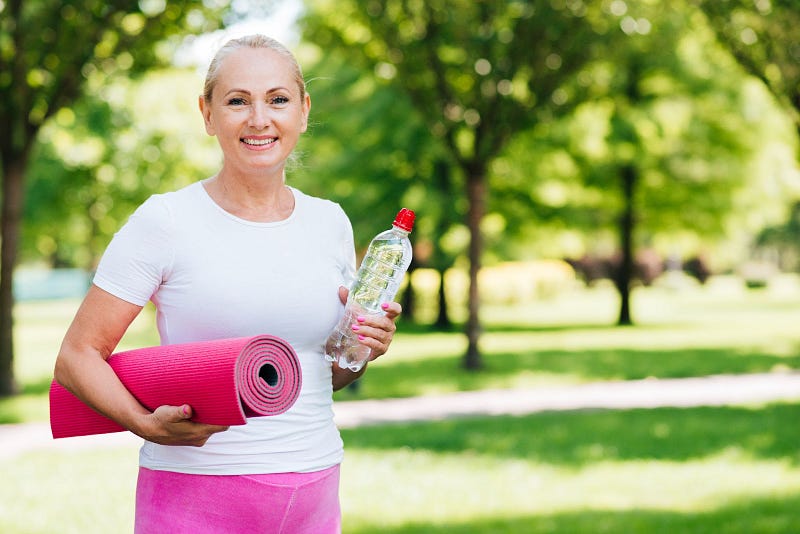Menopause is a significant phase in a woman’s life, often accompanied by various challenges and symptoms.
While it’s a natural part of the aging process, hormonal imbalances, particularly estrogen deficiency, can lead to discomfort and distress.
Today, we’ll explore various natural strategies to support hormone balance and relieve menopausal symptoms.

The Power of Movement
Menopause is a time of change, and one way to navigate it effectively is through movement!
Just as objects at rest tend to stay at rest, our bodies can become stuck in their ways unless we get them in motion.
Exercise not only maintains your physical health but also boosts your emotional well-being during menopause.
So, let’s make a move and take the first step towards a healthier and happier menopause journey.

Understanding Estrogen Deficiency and Its Impact
Estrogen deficiency is a common culprit behind the unwelcome symptoms experienced during menopause, such as hot flashes, night sweats, vaginal dryness, and skin issues.
It’s crucial to comprehend how estrogen plays a pivotal role in your body and how a drop in estrogen levels can lead to these distressing symptoms.
Relative Estrogen Dominance: A Complex Interplay
Now, you may ask: what is relative estrogen dominance?
Well, this occurs when estrogen is low, but progesterone is even lower.
The relative dominance doesn’t refer to high estrogen levels but rather the gap between estrogen and progesterone.
This imbalance can cause a range of menopausal symptoms.
Natural Ways to Support Progesterone

Rather than resorting to synthetic hormone replacement therapies, it’s often more beneficial to seek natural methods to balance your hormone levels.
Here are some great options to try:
- Zinc and Magnesium: These minerals serve as precursors to progesterone and can be found in foods like whole grains and leafy vegetables. They play a vital role in hormone production.
- Fiber: A diet rich in fiber can help balance hormone levels and promote the production of progesterone. Incorporate fiber from sources like fruits, vegetables, and whole grains into your meals.
- Chia, Quinoa, and Veggies: These foods are excellent sources of nutrients that can support progesterone production. Consider adding them to your diet for hormone balance.
- L-Arginine: An amino acid found in foods like nuts and seeds, L-arginine can contribute to increased progesterone levels, making it a valuable addition to your diet.
- Vitamin C: This essential vitamin has been linked to a 77% increase in progesterone levels when taken in doses greater than 750 mg. It’s a simple dietary change that can have a significant impact.
- Collagen: Collagen protein is rich in L-arginine and can be a valuable component of your diet when you’re looking to promote healthy progesterone levels.
- B6 and Multivitamins: These supplements contain zinc and magnesium, making them an easy and convenient way to ensure your body receives these essential nutrients.
By focusing on these dietary choices and nutrients, you can naturally support healthy progesterone levels, potentially reducing menopausal symptoms.
Addressing Estrogen Deficiency Head-On
For those dealing with straight-up estrogen deficiency and its associated symptoms, you can try an approach that encompasses various elements, from nutrition to lifestyle:
- Challenge Plan: Keeping sugar intake in check, decreasing insulin dominance, incorporating 10-minute workouts, and gradually moving towards lower carbohydrate eating and rotational fasting can help address estrogen deficiency.
- Hormone Testing: Consider a DUTCH test, which accurately measures progesterone and estrogen levels. Also, ensure your liver is healthy by monitoring liver enzymes.
- Vitamin D: Vitamin D is a precursor to progesterone and estrogen. Make sure your body receives an adequate supply of this essential vitamin.
- Estrogen-Boosting Foods: Implement an estrogen-boosting smoothie into your diet. This includes ingredients like flax seeds, chia seeds, coconut oil, almonds, and L-arginine. Additionally, include collagen, vitamin C, magnesium, zinc, maca root, and sesame seeds in your diet to support estrogen production.
- Supplements and Herbs: Explore the benefits of supplements like methylated B vitamins and herbs such as black cohosh and chasteberry to address estrogen deficiency and related symptoms.
Conclusion: Navigating Menopause with Natural Solutions
Menopause is a natural part of a woman’s life, but that doesn’t mean you have to suffer through its symptoms!
Understanding the role of hormones, particularly estrogen and progesterone, can be a crucial step in managing this phase effectively.
By incorporating the natural strategies discussed, you can start to take control of your hormone balance and find relief from the discomfort often associated with menopause.
From dietary choices to exercise and supplements, these methods offer a holistic approach for a healthier, more comfortable menopause journey.
Embrace the power of natural solutions and make menopause a time of transition rather than distress.
If you want more tips on supporting your hormone health, I would highly recommend checking out my free book!
You can also visit my website, which hosts other articles like this one, nutritious (and tasty!) recipes that you can try, and a community of people who are on their own health journeys.












